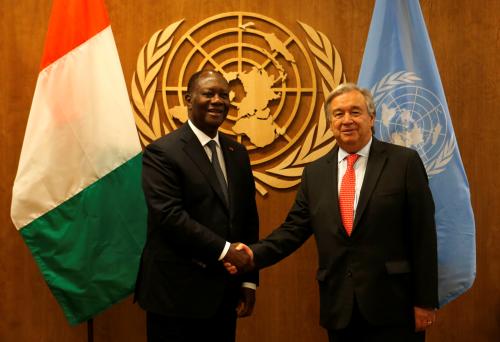Below is a viewpoint from Chapter 1 of the Foresight Africa 2018 report, which explores six overarching themes that provide opportunities for Africa to overcome its obstacles and spur inclusive growth. Read the full chapter on African leadership here.
As the youngest continent, Africa’s ambitions are second only to the voracious appetite of the youth to realize their dreams and build the Africa they want. This journey to success requires a fundamental repositioning of growth strategies and policies. The Sustainable Development Goals (SDGs) embody this challenge; the United Nations Economic Commission for Africa (ECA) as a thought leader seeks to accompany countries through this journey.
Over 60 percent of Africa’s population today had not been born in 1990 but they have enjoyed a period of relative stability and growth. Words like debt relief, the Highly-Indebted Poor Countries (HIPC) Initiative and much less so the Multilateral Debt Relief (MDR) Initiative do not resonate with them. Yet, thanks to these initiatives, several billions of dollars of debt were wiped off the books of thirty African countries, bringing the region’s sovereign debt, which had averaged around 110 percent of GDP at the beginning of the millennium to sustainable levels of about 40 percent of GDP by 2010. However, for many, the torturous exercise of structural adjustments resulting from high debt levels still feeds the dialogue on why development has been stunted in Africa. Commodity price volatility was blamed for Africa’s first bankruptcy. Many countries continue to face the same pressures with regional sovereign debt now averaging 60 percent of GDP but this is now coupled with accelerated population growth, increased climate variability, prevailing health risks especially from HIV/AIDS, malaria, and tuberculosis, a skills gap, gender inequity, and a less supportive external environment pose significant threats, all while at the same time global governance platforms are being stressed.
The primary focus of the Economic Commission for Africa (ECA) is to ensure that, in this increasingly uncertain environment with growing demands on scarce resources, growth-enhancing policies are adopted with the urgency and resolve required for success.
The road to sustainable double-digit growth
The challenge of achieving double-digit growth sustainably continues to elude the continent. Since 2005, countries like Angola, Rwanda, Ethiopia, Ghana, and Nigeria attained double-digit growth at some point but this has not been sustained except in Ethiopia. And—now more than ever—it is the only sure way to accelerate job creation in the face of huge demographic pressures. Importantly, the macroeconomic policy framework needed to generate employment, maintain long-term price stability, and balance external accounts in the face of increasing volatility requires a new look at how we sequence policy. Old prescriptions of pro-cyclical or counter-cyclical policies are no longer an appropriate remedy. Africa must learn to run and chew; manage its debt and grow; and support markets and protect the vulnerable.
Developing policies that support countries in their quest for this balance of a sound macroeconomic framework underpinned by prudent debt, monetary, and fiscal policy management while accelerating growth remains a priority for the ECA.
Building a nation requires firm, stable, and predictable finances
Many African governments have never moved out of a permanent state of pro-cyclical policies with high spending and limited or no increased taxation combined with passive monetary policy. The tax revenue-to-GDP ratio in the region is about 15 percent, lower than in emerging Europe, developing Asia, and Latin America. A few countries like Algeria, Botswana, Lesotho, Morocco, Namibia, and South Africa have recorded tax revenues to GDP in excess of 25 percent, comparable to several in fast-growing Asia. This policy mix has not yielded much economic growth.
Fundamental to any sustainable growth strategy will be financing, own financing in particular. How African economies build higher tax bases to support higher developmental spending—especially for physical and social infrastructure—will be crucial, especially given the targets set by the SDGs. In addition, countries need to mobilize all forms of savings, pensions, and insurance, as well as build institutions able to intermediate these savings into investment. Finally, countries cannot continue to lose the battle on illicit financial flows, mis-pricing, and other forms of capital flight, which is costing the African continent over $50 billion annually.
At the global level, building on recent successes, more advocacy will be needed. The ECA proposes to work on these issues using technology as an enabler.
A strong public-private alliance to build functioning markets
The private sector, like the public sector, flourishes when financing is secured and tailored to the needs of the market. African countries in the last decade have increasingly turned to the market to raise capital for development financing, though the depth of capital markets available remains shallow. Excluding South Africa, stock market capitalization of listed companies is as low as 7 percent in Nigeria, 10 percent in Egypt, and 20 percent in Tunisia—all below the 58 percent average for low- and middle-income countries. Furthermore, the models for structuring financing under public-private partnerships remain limited. ECA proposes to support a massive push to design new and innovative financing mechanisms to rapidly unlock capital to finance Africa’s infrastructure, particularly energy, water, logistics, education, and health. How do we finance the re-tooling and skilling of the young population set to diversify, create increased value, and transform Africa? These questions need fresh answers for a fresh generation. Working with more of Africa’s private sector so they can access the capital markets is the next big challenge; this will require rating more African corporates.
The role of functioning markets in both the public and the private sector must grow, and Africa’s transformation will be buoyed by increased intra-regional trade in value added goods and services, and global trade. With its youthful population, Africa stands to be the continent of innovation. Creating the right environment for market institutions and the private sector to flourish will be critical for a more robust, value adding, diversified, and job-creating growth process to take hold. The recently negotiated Continental Free Trade Agreement (CFTA) provides a unique opportunity for African countries to build on their competitive advantages and develop more robust trade platforms capable of integrating regional and global value chains.
ECA will continue to support this ambition, especially the implementation of CFTA. As African countries improve their environments, at the global level there is an increasing need to ensure that policies meant to manage risk in other markets do not unduly harm the growth efforts of the continent.
A stable and predictable social contract
Finally, institutions, governance, and leadership will ultimately determine how countries fare over the next decade in the quest for double-digit growth. The 2017 Mo Ibrahim Index of African Governance indicates that while 40 African countries have improved in overall governance over the last 10 years, the pace of improvement has either slowed in the last five years (Rwanda and Ethiopia) or shows decline (Mauritius, Cameroon, and Angola). For decades, ECA has been working on this agenda, first through its support to the African Peer Review Mechanism, but also through its work on country development plans. Tackling the arduous tasks of building institutions, and creating transparent processes for economic, social, and political participation remains crucial. As populations explode, more decentralized and more representative governance systems will be vital to ensure speedy results, as aspirations and ambitions will differ from rural to urban settings, and from women to men, for example. Governance systems like the African Peer Review mechanism will need to include people and the youth most especially in a new and more dynamic governance framework. Notably, the implementation of policies and projects for inclusive growth must be monitorable, measurable, and underpinned by reliable data. Through its work on improving statistics and tracking decisions, and most of all monitoring SDG progress, the ECA will work to improve all aspects of governance on the continent.









Commentary
Foresight Africa viewpoint – Economic Commission for Africa: Priorities for a prosperous Africa in 2018
January 16, 2018